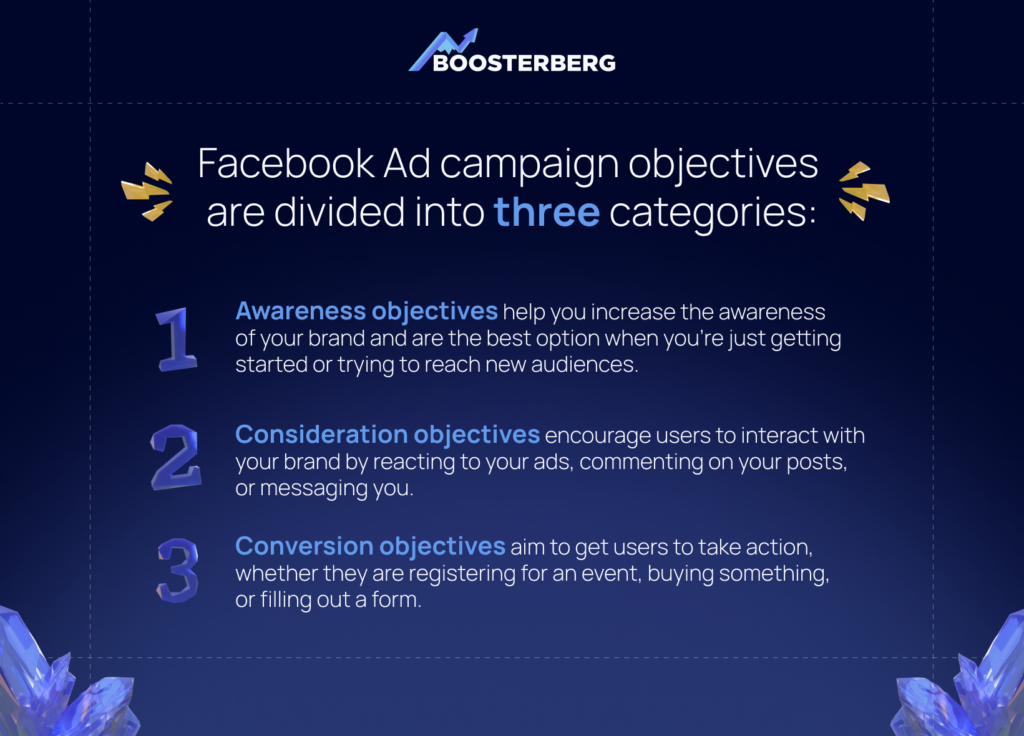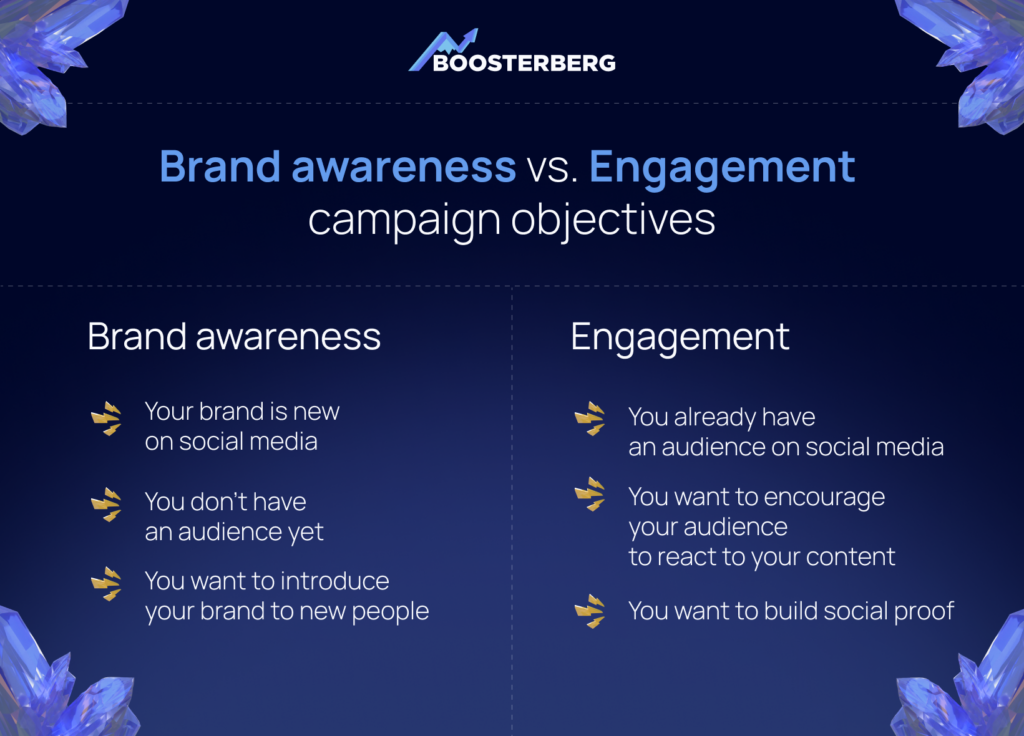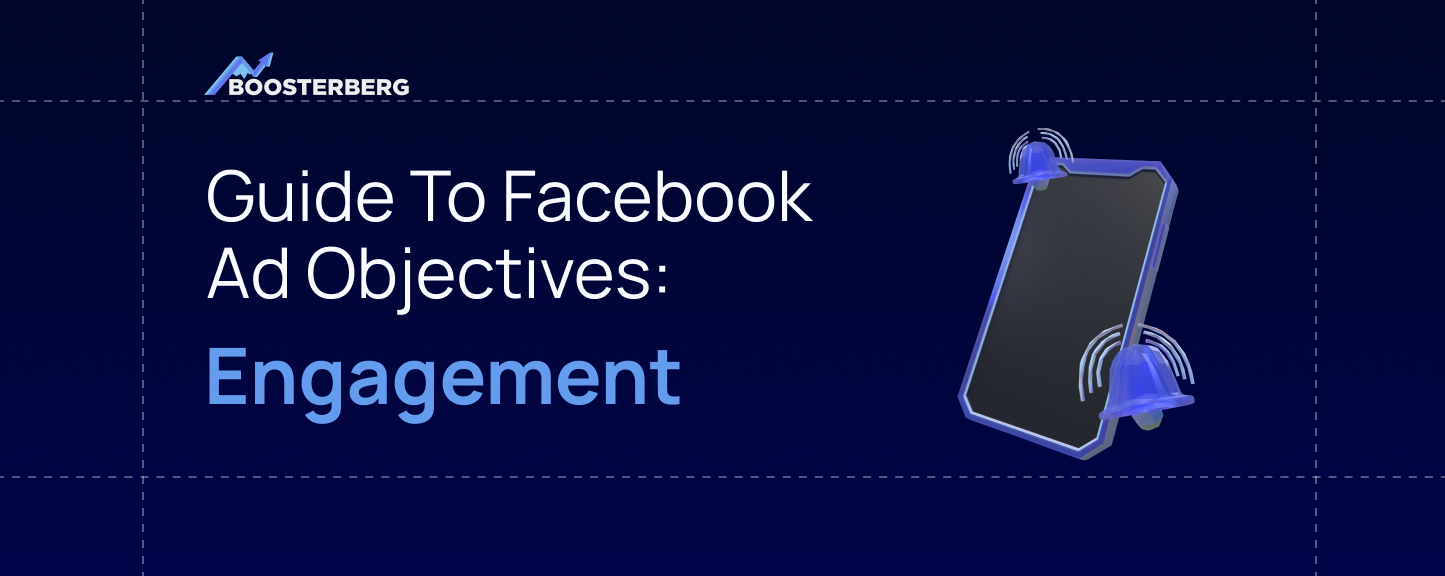In this article, we’re going to discuss the engagement objective in Facebook ads. But first, let’s look at what the ad objectives actually are.
To create a Facebook ad, you must first select an objective. This is important because it defines the goal of the ad. Depending on your objective, Facebook will optimize your ad for that goal and provide you with the best resources and options for achieving it.
You can choose between a few objectives. Choosing the right one depends on what you want to accomplish with your ads.
Facebook Ad campaign objectives are divided into three categories:
- Awareness objectives help you increase the awareness of your brand and are the best option when you’re just getting started or trying to reach new audiences.
- Consideration objectives encourage users to interact with your brand by reacting to your ads, commenting on your posts, or messaging you.
- Conversion objectives aim to get users to take action, whether they are registering for an event, buying something, or filling out a form.
Our previous article discussed the brand awareness goal, which falls within the awareness stage of the marketing funnel. In this article, we will introduce another one – the engagement objective, which is generally used in the consideration or MOFU stage.

Facebook Ad Objective – Engagement
Choosing the engagement objective tells Facebook the goal of your ads is to get people engaged with your brand. An engagement could be anything from a reaction, like, comment, or share to a response to an event or claim of an offer.
This campaign objective is useful when you’re past the first step of raising brand awareness for your newly launched brand and want to build social proof. In general, social media engagement ads can be valuable tools for businesses looking to increase visibility and brand awareness.
The difference between engagement and brand awareness ad campaign objectives
Both objectives are useful for building brand awareness, but they work best at different stages.
Choose the brand awareness objective if you’ve just started a business and don’t have an audience on social media. A brand awareness campaign is most effective when introducing your brand to new people.
After building an audience around your brand, you can switch to or add engagement campaigns to your ad strategy. This will generate social proof of people interacting with and enjoying your content.
At the awareness stage, brand awareness campaigns will provide you with valuable information about your audience’s type and behavior. This will help you optimize engagement campaigns at the consideration stage.
When you’re still unknown to social media users, focus on brand awareness; when your brand is well known, focus on engagement.

Pros of the Engagement Ad Objective
If advertisers pick their campaign objectives wisely, every objective comes with benefits. The following are some benefits of using the engagement objective:
- Increased visibility and brand awareness for your brand
Engagement ads are designed to generate interactions, such as likes, comments, and shares, which increases your content’s visibility. As users engage with your content, their followers and friends will also see it, increasing your chances of getting new followers.
A high engagement rate on your page can help build trust and credibility with your audience, increasing brand awareness along the way. Your potential customers and followers are more likely to trust your brand if they see other users interacting with and liking your content.
- Cost-effectiveness
Due to its ability to generate significant engagement at a relatively low cost, engagement is often considered a cost-effective objective. As it is optimized to generate reactions rather than clicks and conversions, it typically has a lower cost per result.
By using the engagement objective, you can increase the relevance score of your ads, which can lower your ad costs. Relevance score measures how well your ad resonates with your audience. Generally, the higher the score, the lower the ad cost.
Also, in terms of visibility, engagement ads can increase your organic reach on Facebook, lowering your overall advertising costs.
- Getting valuable insights about your target audience and your ad’s performance
With the engagement objective for your ad campaign, you will be able to gain valuable insight about your target audience. Using this information, you can optimize your advertising campaign.
You can gain insight into:
- Engagement metrics: The number of likes, comments, and shares can give you insight into how well your content is received by your audience.
- Audience insights: By gathering information about your audience, you can find out what they like, what they do, and who they are. As a result, you can tailor your content specifically to the needs and wants of your target audience.
- Ad performance: Metrics such as frequency, cost per engagement, or reach can give you a better understanding of your ad’s performance.
- A/B testing: The engagement objective allows you to test different ad versions to determine which performs the best. In this way, you can optimize your advertising campaign.
Is there a downside to using engagement as an ad objective? The answer is yes and no. Again, it depends on your advertising goals.
Here are a few potential drawbacks to remember:
- Limited impact on sales: While engagement is important for building brand awareness, it does not always translate into sales. For this reason, you should not use the engagement objective if you want to increase sales or conversions.
- High competition: Due to the popularity of the engagement objective among advertisers, there is high competition for ad space, which can increase advertising costs.
- Potential low-quality engagement: Not all engagement is quality engagement that will provide value over time. There is a possibility that some users will engage with your ad just to enter a contest or receive a discount, or they may react negatively.
The engagement ad objective is a cost-effective advertising option to help you generate engagement with your content, improve your relevance score, and increase your organic reach on social media platforms. If you aim to increase interaction with your audience and build brand awareness, you should choose the engagement objective for your Facebook ads.
